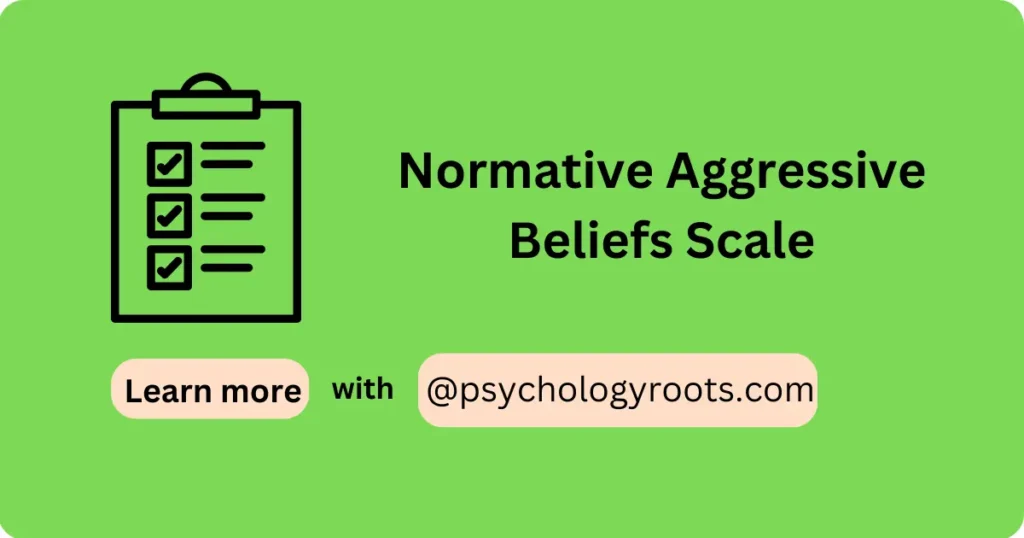Table of Contents
Normative Aggressive Beliefs Scale
Here in this post, we are sharing the “Normative Aggressive Beliefs Scale”. You can read psychometric and Author information. We have thousands of Scales and questionnaires in our collection (See Scales and Questionnaires). You can demand us any scale and questionnaires related to psychology through our community, and we will provide you with a short time. Keep visiting Psychology Roots.
About Scale Name
Scale Name
Normative Aggressive Beliefs Scale
Author Details
Craig A. Anderson
Translation Availability
Not Sure

Background/Description
Aggressive beliefs are beliefs about the appropriateness of using aggression to achieve one’s goals. They can be about the use of physical violence, verbal aggression, or other forms of aggressive behavior. Aggressive beliefs are often held by people who have been exposed to violence or aggression in their lives, or who have learned that aggression is an effective way to get what they want.
There is a growing body of research that suggests that aggressive beliefs are associated with aggressive behavior. For example, one study found that adolescents who scored higher on a measure of aggressive beliefs were more likely to engage in aggressive behavior over a period of 18 months.
The development of aggressive beliefs is a complex process that is influenced by a variety of factors, including:
- Exposure to violence: People who are exposed to violence, either directly or indirectly, are more likely to develop aggressive beliefs.
- Learning: People can learn aggressive beliefs from their parents, peers, or the media.
- Personality: Some people are simply more predisposed to aggressive beliefs than others.
Aggressive beliefs can be difficult to change, but there are a number of interventions that have been shown to be effective. These interventions typically involve teaching people alternative ways of thinking about and responding to conflict.
Administration, Scoring and Interpretation
- Following the instructions: The first step is to read the instructions carefully and make sure that you understand them. This will help you to administer the test correctly and to answer any questions that the individual or group may have.
- Creating a comfortable environment: The test should be administered in a quiet, comfortable environment where the individual or group will not be interrupted. This will help to reduce distractions and to ensure that the individual or group is able to focus on the test.
- Establishing rapport: It is important to establish rapport with the individual or group before you begin the test. This will help to put them at ease and to make them more comfortable with the testing process.
- Providing clear instructions: Make sure that you provide clear instructions to the individual or group before you begin the test. This will help to ensure that they understand what they are supposed to do and that they are able to complete the test correctly.
- Monitoring the individual or group: It is important to monitor the individual or group throughout the testing process. This will help to ensure that they are not having any difficulty with the test and that they are able to complete it in a timely manner.
- Encouraging the individual or group: It is important to encourage the individual or group throughout the testing process. This will help to keep them motivated and to ensure that they complete the test to the best of their ability.
Reliability and Validity
N/A
Available Versions
09-Items
Reference
Anderson, C.A., Gentile, D.A., & Buckley, K.E. (2007). Violent Video Game Effects on Children and Adolescents: Theory, Research, and Public Policy. New York: Oxford University Press.
Important Link
Scale File:
Disclaimer
Please note that Psychology Roots does not have the right to grant permission for the use of any psychological scales or assessments listed on its website. To use any scale or assessment, you must obtain permission directly from the author or translator of the tool. Psychology Roots provides information about various tools and their administration procedures, but it is your responsibility to obtain proper permissions before using any scale or assessment. If you need further information about an author’s contact details, please submit a query to the Psychology Roots team.
Help Us Improve This Article
Have you discovered an inaccuracy? We put out great effort to give accurate and scientifically trustworthy information to our readers. Please notify us if you discover any typographical or grammatical errors.
Make a comment. We acknowledge and appreciate your efforts.
If you have any scale or any material related to psychology kindly share it with us at psychologyroots@gmail.com. We help others on behalf of you.